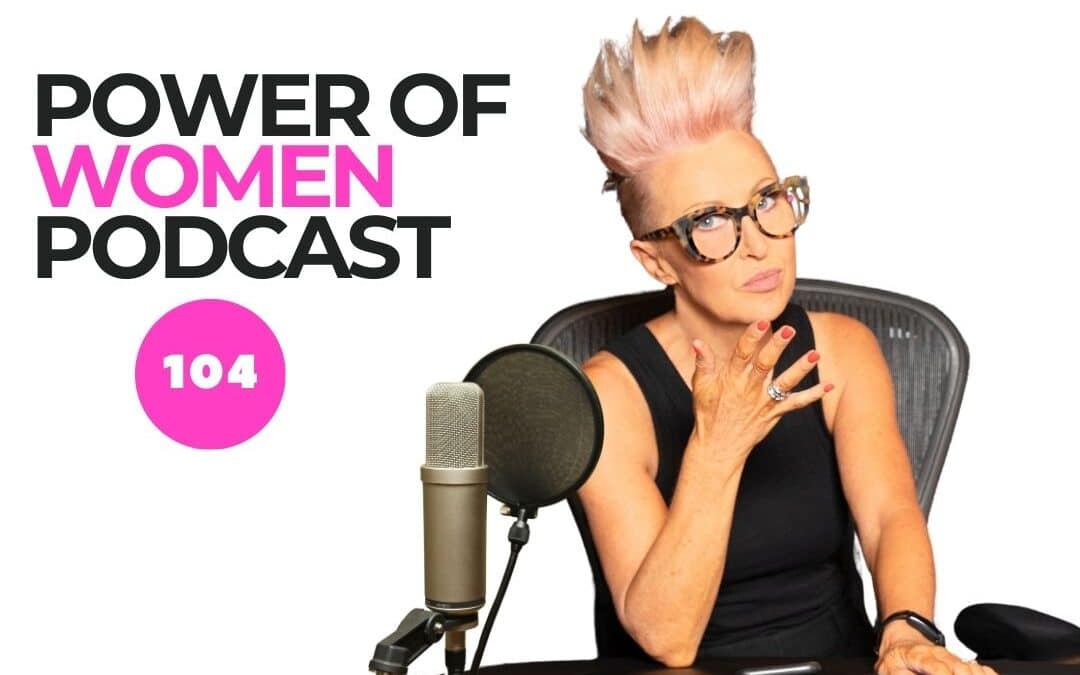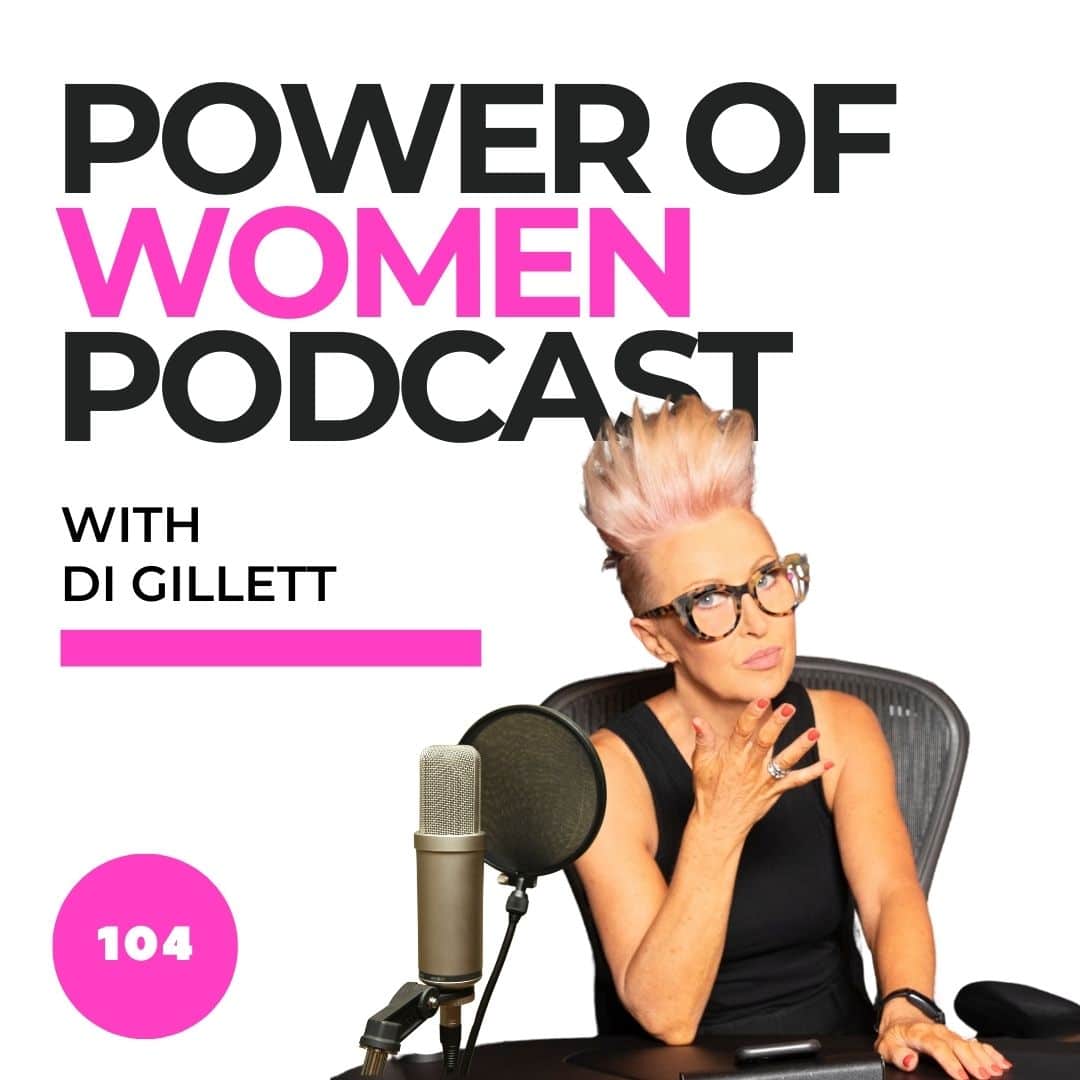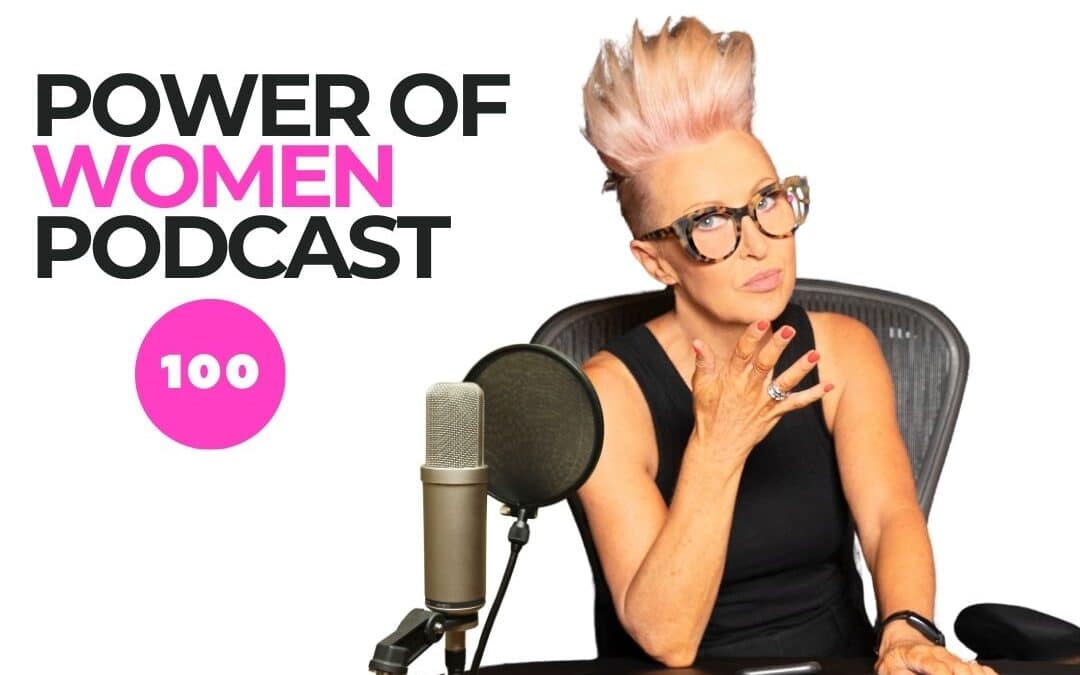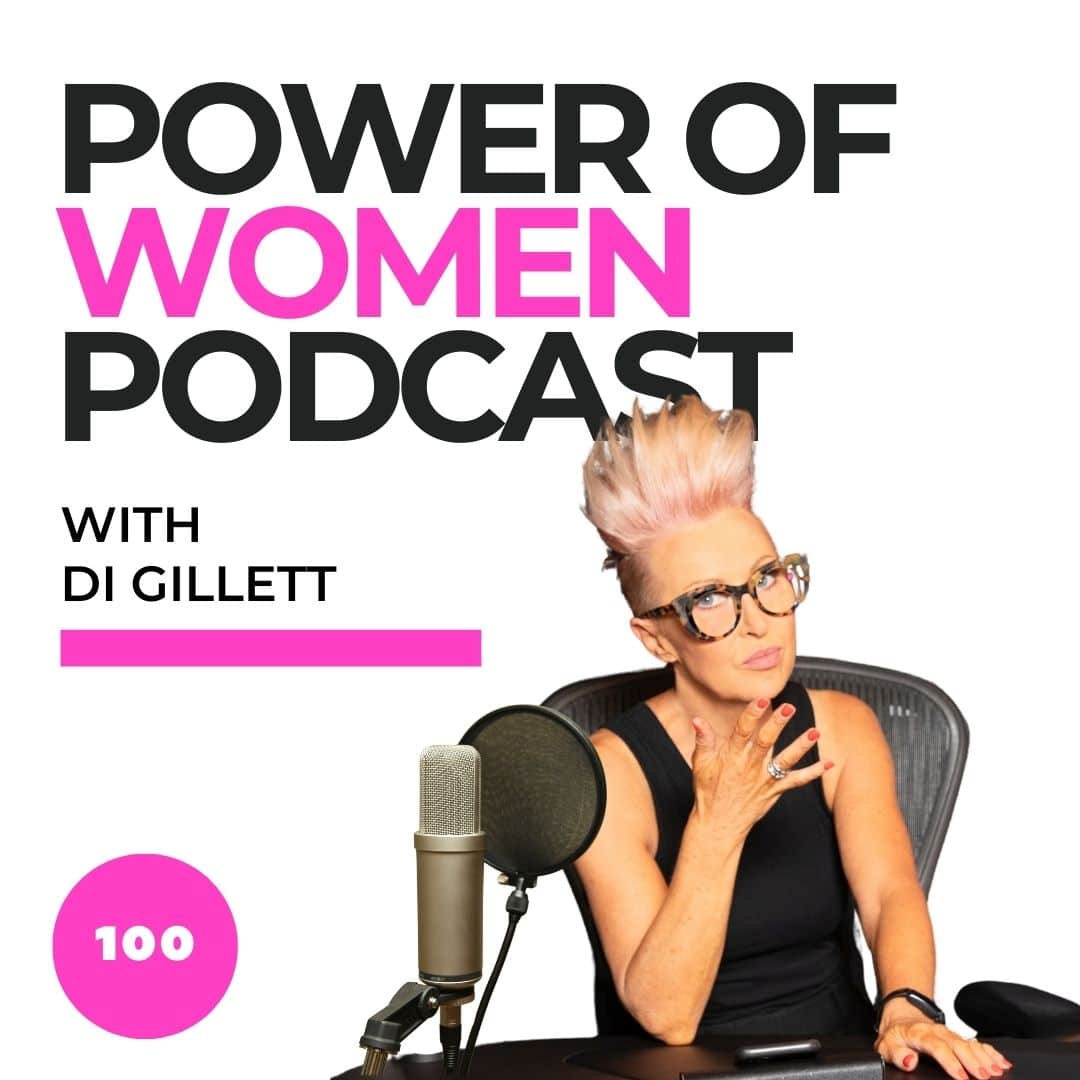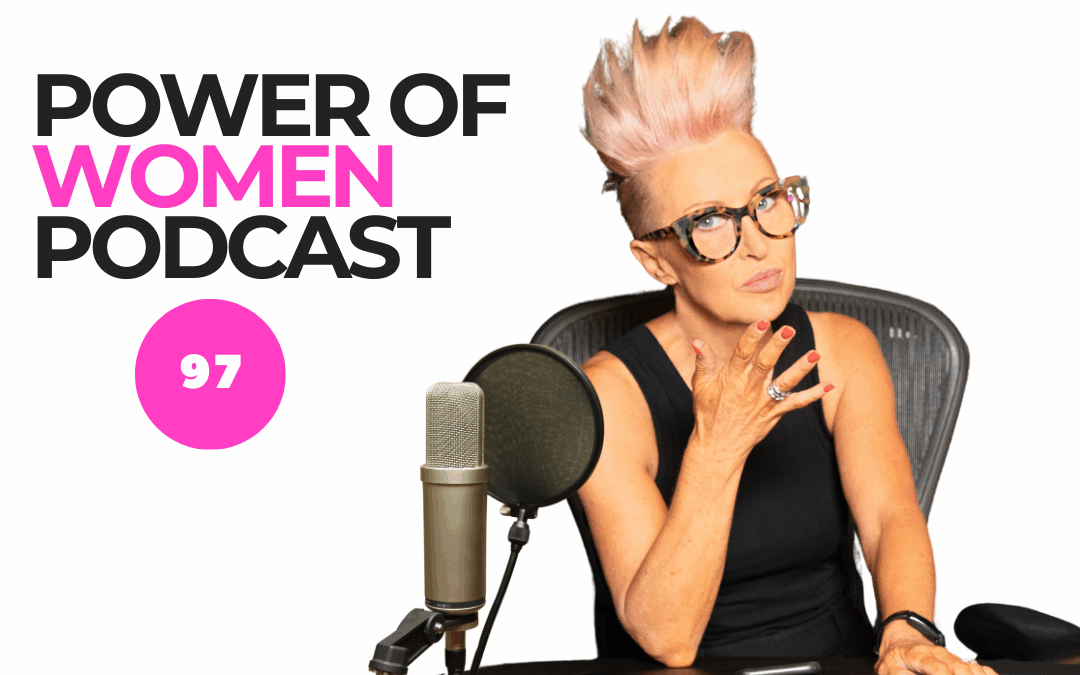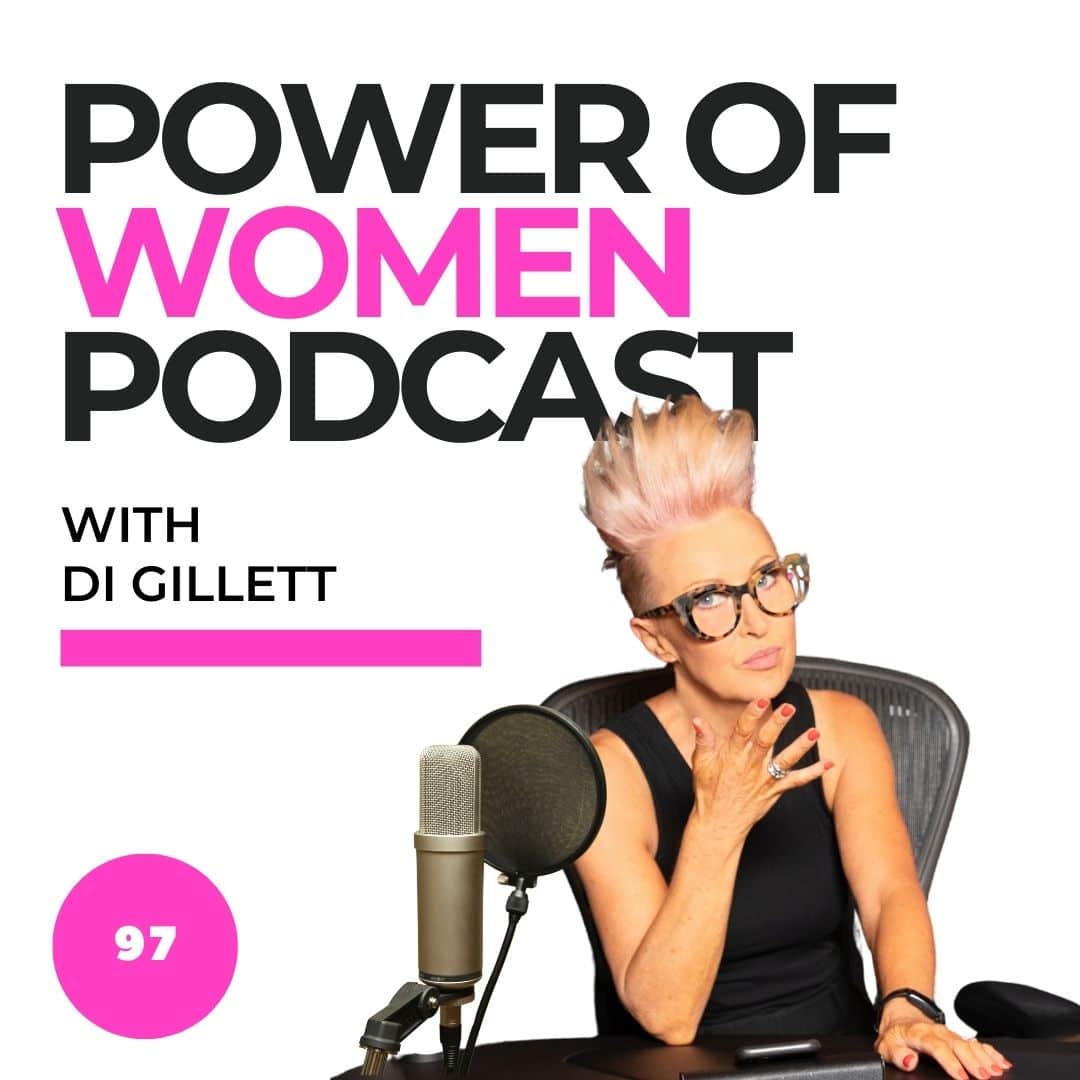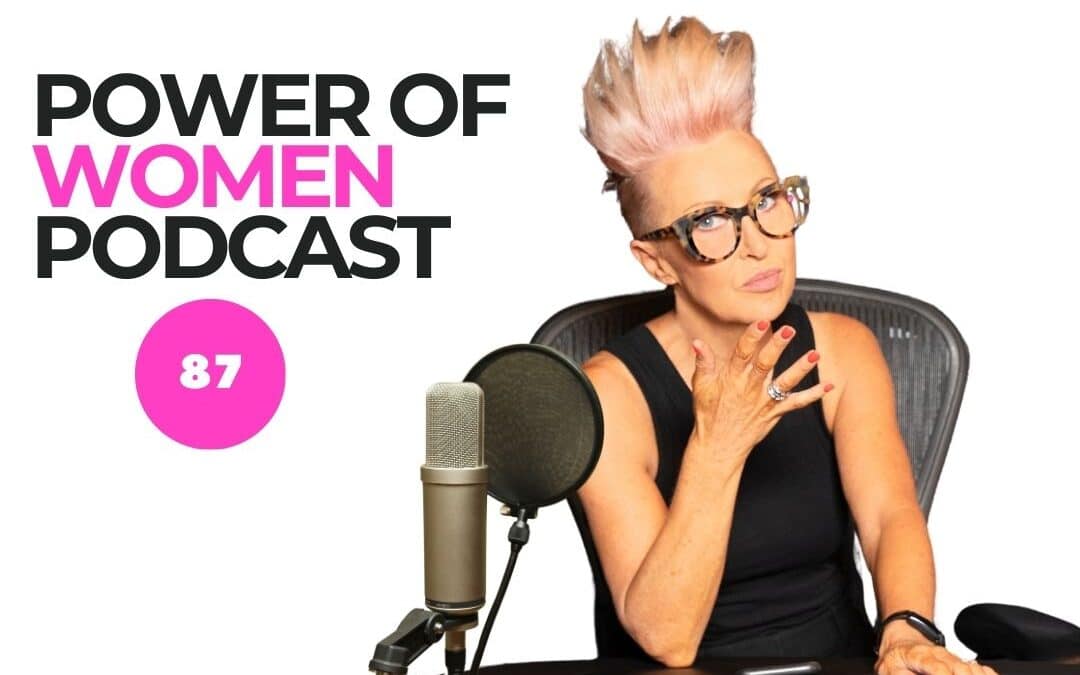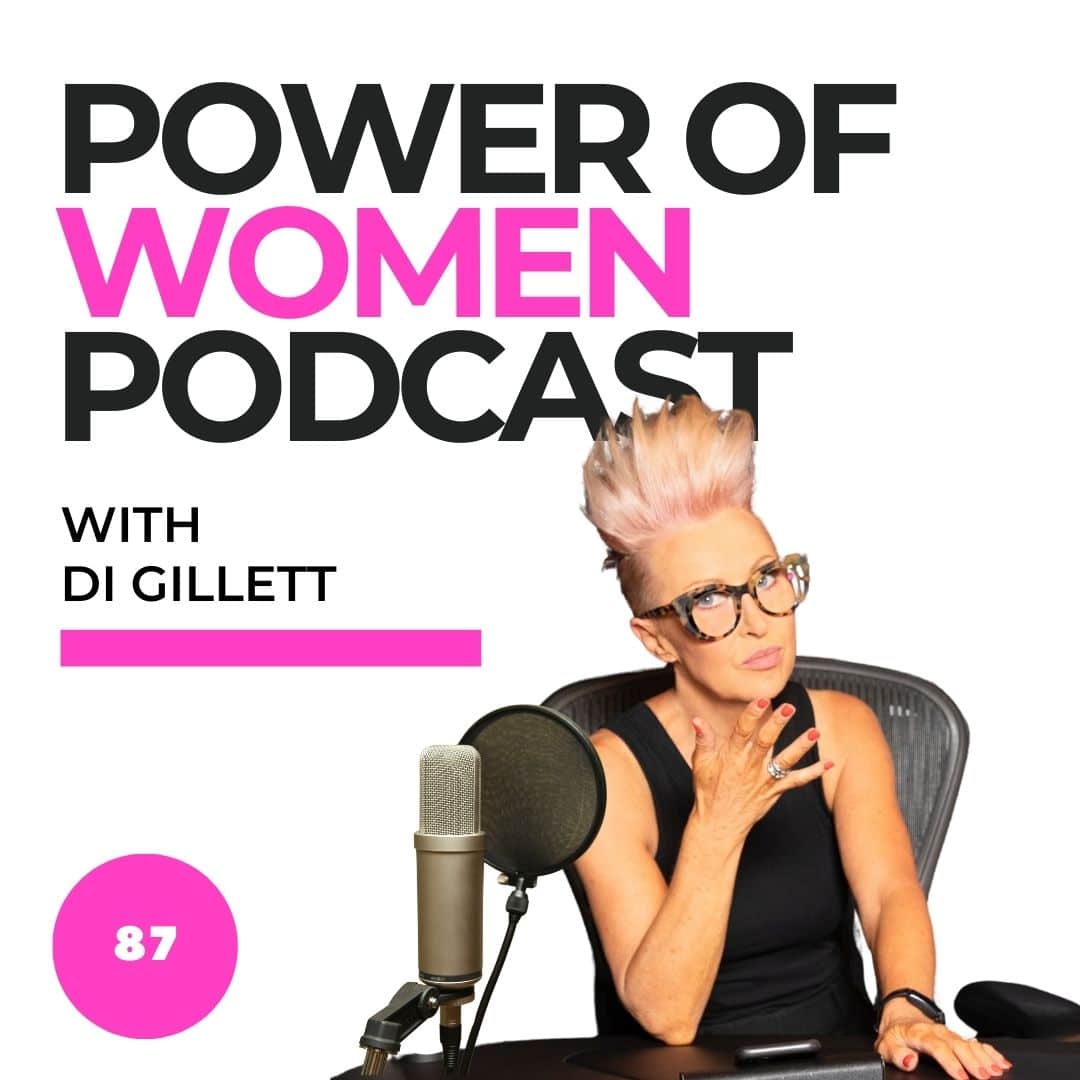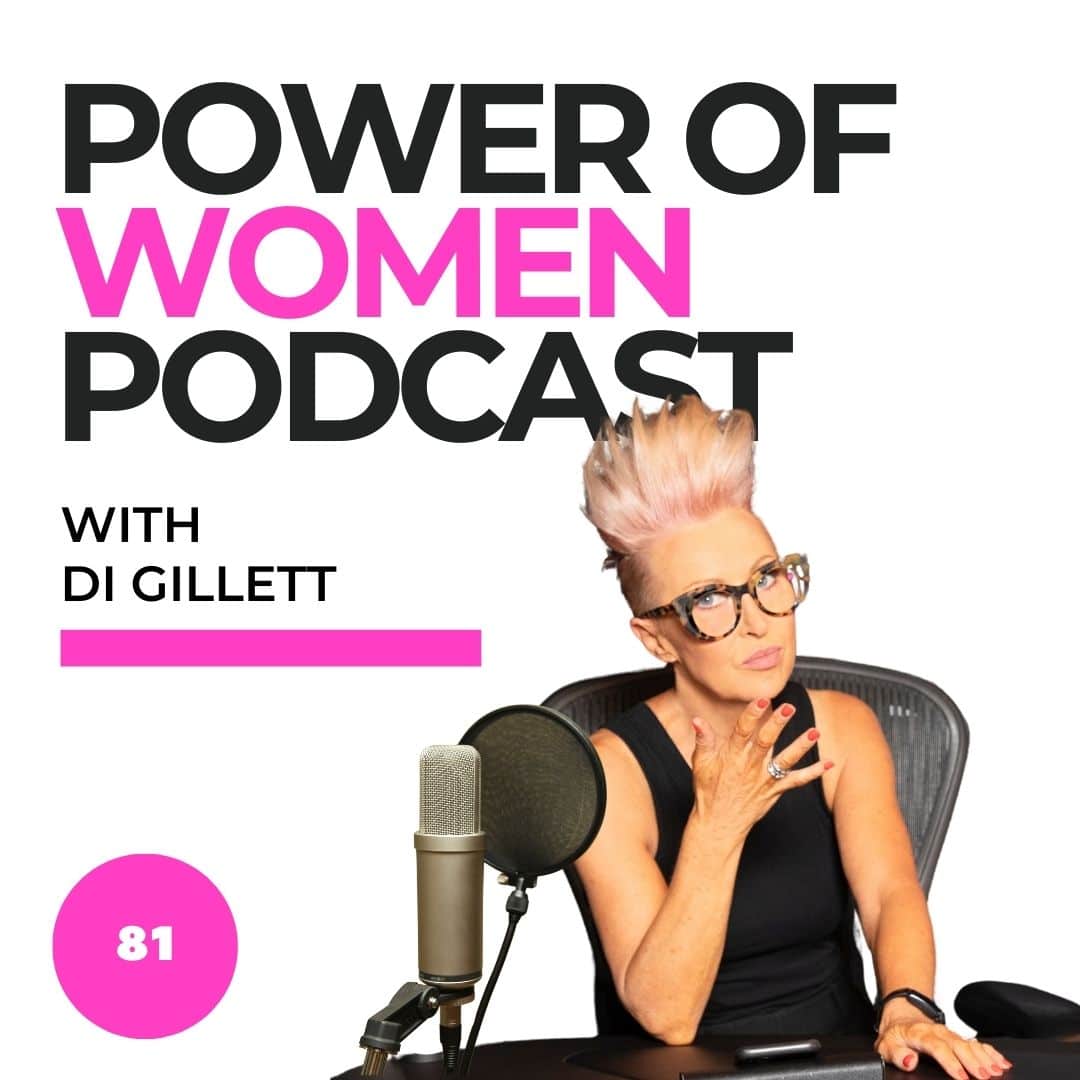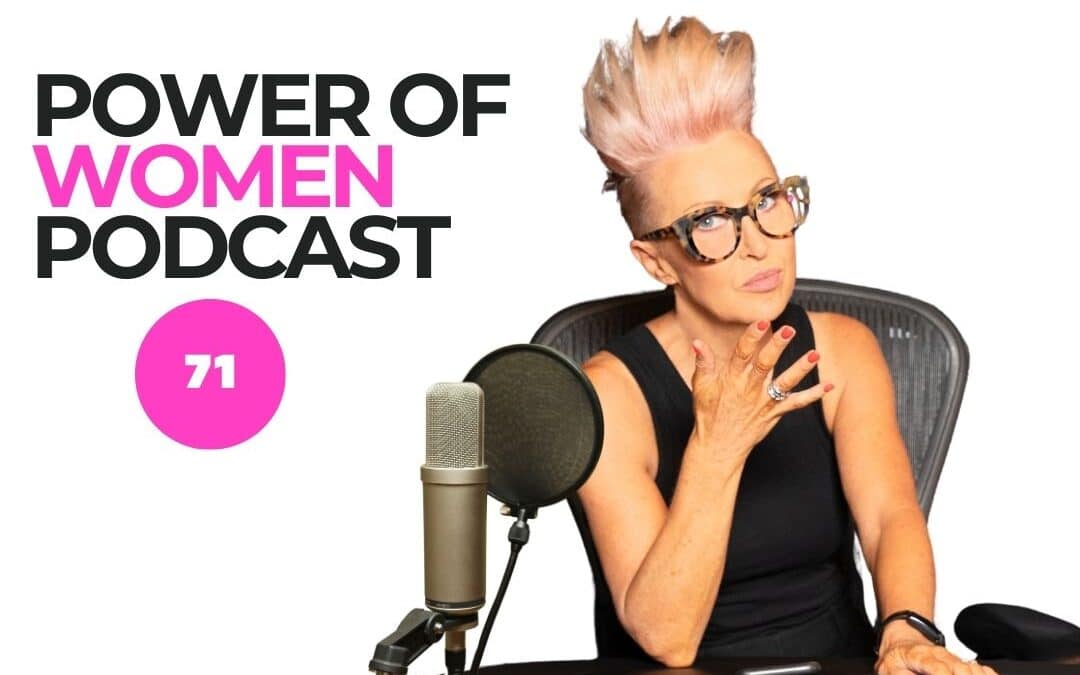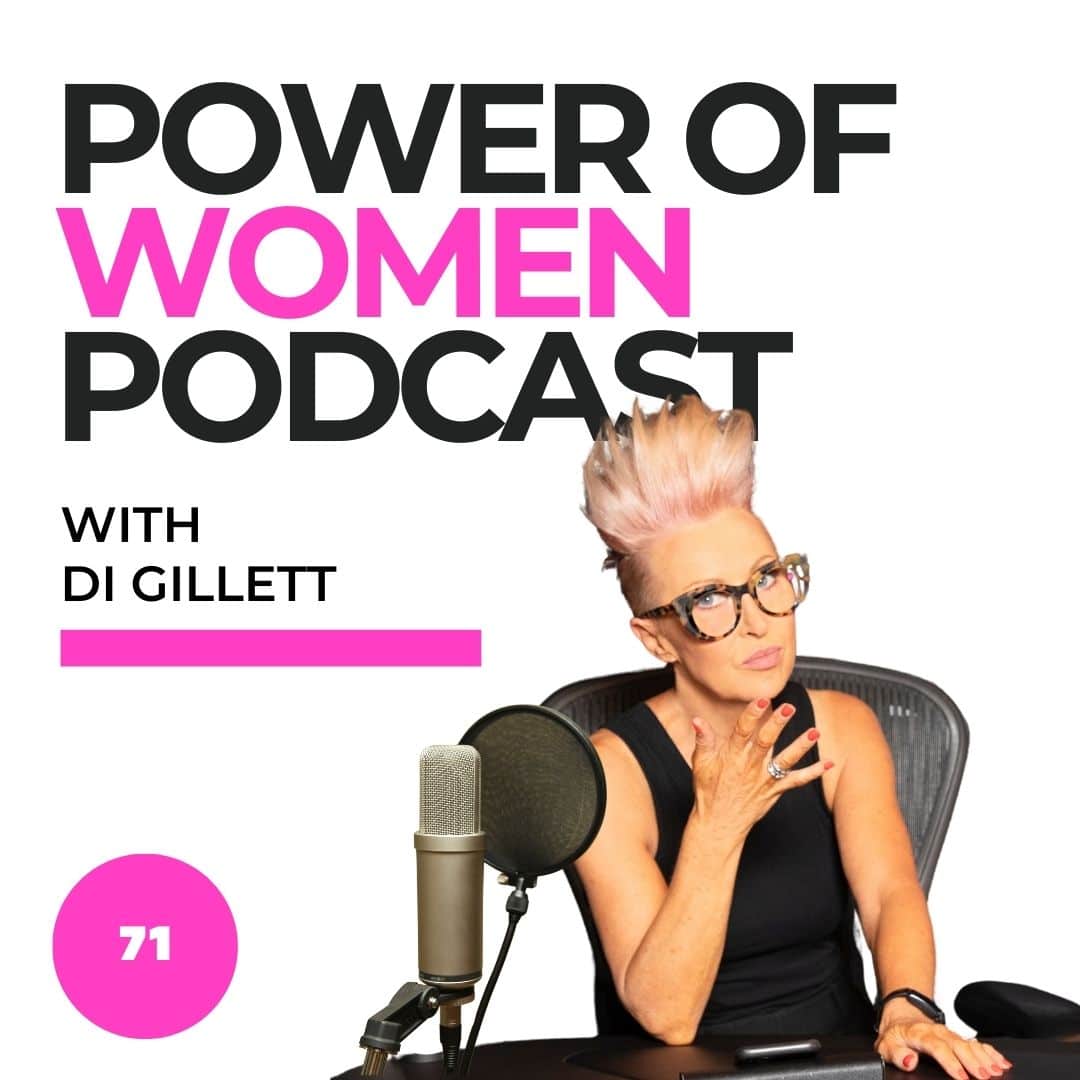JO TARNAWSKY (00:00)
I believe that courage and integrity has never been more important. I think that standing up and speaking out comes with a cost, but so does remaining silent. And I think finding your people can make a world of difference.
I was just blindsided. So I think that’s probably something that maybe your audience can imagine that you get these life quakes. I was still trying to make sense of it because it didn’t make sense to me. It’s when I tried to return to the workplace, the prime minister’s chief of staff just told me, well, basically that that was a ridiculous, you know,
Of course, I can’t come back, but all my things are still in my office. And how does the Deputy Prime Minister’s Chief of Staff just disappear with no notice midway through a Tuesday? It just didn’t make any sense.
DI GILLETT – Host (00:48)
I’m Di Gillett and welcome to the Power of Women Podcast.
today’s story is a powerful one and one that in fact did make the headlines in 2025. It’s a conversation about the impact of toxic workplaces,
what happens when the system lets you down, the cost of speaking out, but most importantly,
how not to let those experiences define you or hold you back.
Jo Tarnawsky welcome to the Power of Women podcast.
JO TARNAWSKY (01:21)
Thank you so much, Di. It’s absolutely wonderful to be here. I’m happy to say I’ve caught a number of your podcasts this year. I think it’s an incredible series. So thank you for doing it.
DI GILLETT – Host (01:32)
firstly, I want to say thank you for choosing the Power of Women podcast to be the very first time to talk about your story in a bit more detail publicly, because I know it takes courage to do that, and I am really honored that you’ve trusted us with this today. Before we step into the more challenging part of your recent experience, I would love to hear about your career journey, you’ve held
senior roles at the Department of Foreign Affairs and Trade. And you have represented Australia across international postings. Can you take us through some of the highlights and some of your proudest moments?
JO TARNAWSKY (02:13)
Yeah, absolutely. ⁓ I’ve been really lucky to have almost two decades of experience working in diplomacy and worked in some incredible places, met some wonderful people, doing some really interesting things. ⁓ I think one of the things about being a diplomat is that ⁓ on any given day you could be wearing multiple hats. You can be an advisor, an event planner. You could be helping someone with a lost passport or a consular issue.
You can be writing some kind of geopolitical analysis, meeting with international dignitaries, a whole range of things. ⁓ And, you know, I think it also comes with some challenges. think there’s a public sort of perception of diplomats at cocktail parties and and traveling around. But I’ve got to say that, you know, this
There’s a whole lot of other work that goes often unseen behind the scenes. I know, for example, that ⁓ across my experience, ⁓ in addition to, of course, attending cocktail parties, I’ve been deployed to war zones. ⁓ I’ve been held up at gunpoint more than once. I was nearly kidnapped at one point. And a lot of the work that’s done is invisible. ⁓ But of course, it also gives you extraordinary opportunities.
DI GILLETT – Host (03:36)
Are you out to shed any light on some of those more challenging moments? Gunpoint and kidnap? is that confidential?
JO TARNAWSKY (03:44)
No, In one instance, I was in Zimbabwe during some of the height of the Mugabe era. And I just happened to be in the wrong place, wrong time. And I was driving to work. I was there on a short term mission during it was around 2007, 2008, when there was a runoff election. Mugabe had not won the first time around. And I was on my way to the embassy and Mugabe’s
⁓ entourage happened to go by and I was front of line and you see it coming, there’s warning sort of motorcycles I pulled over to the side of the road but I just happened to be near where his residence was and so he was going to pass in front of me and so some lovely looking chaps with some very large weapons came right up to where I was sitting in the driver’s seat and held a gun basically to my head ⁓ just to make sure I
wasn’t going to take one for humanity basically, and stayed where I was. So that was one of them. And then on another ⁓ incident, ⁓ I was acting High Commissioner in Trinidad and Tobago for a couple of months. A lot of people sort of, again, think of the Caribbean as this, as the beaches and the, you know, they have very romantic notions, but actually Trinidad and Tobago, you can see the coast of Venezuela from there. There’s a run of drugs and
all sorts of things that go through that channel. There’s actually like a murder count when I was there on the front pages of the paper. And they just had a huge security crackdown for the Summit of Americas where President Obama and a whole range of other leaders had come in. so crime had sort of stopped or been contained for about two months. And then, of course, once all of that left, it spiked.
And again, wrong place, wrong time. And I ended up being somewhere that was subject to an armed robbery for where there was about eight gunmen that held me up. Yeah, that was definitely one of the more traumatizing experiences that I had. And yeah, but I’ve got to say that, you know, I’ve worked a defect with a whole range of people that have had their own experiences and
have gone out and done the hard yards and so many people have a story either being deployed to war zones or working through tsunamis or being at embassies that have been attacked. And so it really is sometimes frontline service in the national interest.
DI GILLETT – Host (06:23)
Is there professional counselling that is offered to diplomats who’ve experienced such things?
JO TARNAWSKY (06:30)
There is now. When I first started back in 2002, I remember being one of the first people called in the middle of the night when the first Bali bombings hit. We were sort of called out of bed. And to be honest, I was a graduate. I thought it was a training, a training sort of event. was nothing on the news. This is before social.
it was around 2002, 2003, yeah, 2002 maybe. And so we were called in the middle of the night, early one Sunday morning, even by the time we got to headquarters, the religious programming was still on the news. So it all kind of felt a bit surreal. But then when they flicked the phones on, were people already, there were already online families waiting to get through. And it was real.
And it even at that early stage took a little while for counselors to sort of be debriefing after every shift, because you’d have quite, you know, you’d have people that may have lost loved ones or just people who had canceled their holidays. And there was no sort of, couldn’t work out who would be the angst, but you would sometimes be the first person that was speaking to. And so a lot of that confusion or anger was directed at you. And.
So they’ve got better, whereas I think there’s now there’s multiple full-time counselors that go out to visit embassies, posts, as we call them, on a regular basis ⁓ to check in. They have people on that. And so it’s got, the system has got a lot better ⁓ in ensuring that sort of support is available to staff.
DI GILLETT – Host (08:05)
So how many years all up did you spend overseas, Jo?
JO TARNAWSKY (08:09)
So on and off my first posting, four year, three year posting was in Papua New Guinea. Then I did a series of jobs over several years where it might be deployed somewhere for just a couple of months. So that included places like Iraq, like Zimbabwe, Kenya. I worked on a kidnapping case there, Ethiopia to help VIP visits come in, Trinidad and Tobago, Fiji. There was a whole range of things. And then my very last posting was actually to Italy.
where I was acting ambassador for the first six months and then I was deputy ambassador for the next three years. I was also worked out at the World Food Program, the United Nations World Food Program and a couple of the other international organizations. And we were also accredited to Libya, Albania, San Marino, which, you know, also it’s a small embassy And
everybody sort of thinks, wow, Italy, how easy it had the highest number of lost and stolen passports there at the time. This is pre-COVID, so it definitely kept us on our toes. But the other thing that happened to me while I was there was I got cancer. so, yes, so it wasn’t all quite ⁓ Prosecco at the Coliseum. ⁓
DI GILLETT – Host (09:22)
What
do you do when that happens in a foreign country? Do you jump a plane and head home or do you start to deal with it in country?
JO TARNAWSKY (09:28)
think it depends on the country. Obviously most of the other places, if I had been there when I had been diagnosed, you would want to come home. But I was a long way from home in a country which did have medical procedures. And to be honest with you, I had never needed anything more than a vaccination. ⁓ And something in my gut just told me they can do the surgery here next Wednesday. And even though there was a few questions around how much would it cost and.
DI GILLETT – Host (09:36)
put it home.
JO TARNAWSKY (09:58)
Could I come home and all those sorts of things. It was really lucky that I trusted my gut because when they got the tumor out, it was breast cancer and they saw how fast it was running and the type I had tripped. Time is everything. They say that if I had got four to six weeks later, I wouldn’t be here now.
DI GILLETT – Host (10:10)
Time was everything.
There’s a lot to be said for intuition.
JO TARNAWSKY (10:19)
Yes, there is. of course I just, you never think it’s going to happen to you until it does. And, you know, then you’ve just got to go with it really. And so I had the full dense dose chemo, lost my hair. ⁓ And I think one of the hardest parts of leaving Italy was not the gelato shops on every corner ⁓ and the historic buildings. It was actually leaving my oncologist. Cause you also developed quite a rapport.
obviously with somebody you’ve come to know through one of those experiences. Yeah.
DI GILLETT – Host (10:52)
Did you work through the procedure in the chemo or did you take time out completely to recover?
JO TARNAWSKY (10:59)
I worked through most of it, not the early stages. DFAT had originally wanted me to come home. And so I was at pains not to be a problem. And I, you know, so what I did was I took off for surgery. I also didn’t know what was coming in hindsight. So by the time I had surgery, no one would talk to me about chemo.
And in fact, defat would only sort of sign off on the surgery if there wasn’t mention of it. And if, you know, it didn’t look like I was going to need sort of long-term help. And so it wasn’t until after they got the tumor results that they realized actually you you need chemo and you need it fast. So it’s, then with that, they can tell you exactly when you’re going to start losing your hair. And so I decided that I would go through that and I, and so it’s around day 14 or so that it starts falling out. And, you know, my daughter was only three.
She was going through a Rapunzel phase, you know, focusing on getting her through that. And so I waited for my hair to fall out. But actually because of cutbacks in the overseas service, I had actually absorbed another whole full-time role about six months earlier. I was doing two jobs anyway. So what they did was they ended up bringing somebody in on a short-term mission so that I just did one job and they did the other. But then the other thing too was,
I was very careful. Exercise was the thing that was absolutely a game changer for me. And so I just worked strict hours. I stuck to my schedule for that. And I think too what was also helpful was having a routine at home. So I pulled back the hours, I pulled back the scope, I wasn’t silly about it, but having some routine brought some normality. I think it also helped me return to the workforce more fully when my treatment ended because
It wasn’t I didn’t have this gigantic mountain to cross. I’d kind of kept a little bit in the loop as to what was happening. I mean, that said, anyone who’s been through treatment knows the fatigue, the physical fatigue knocks you off your feet. Once your hair grows, starts growing back after treatment’s finished, everybody thinks it’s over. And to be honest with you, that was one of the hardest experiences was when treatment ended because there was nothing left to fight and you just had to, you know, you were waiting for it to come back.
But I think mentally too, like the cognitive impacts aren’t something that people fully appreciate. So I know the second cocktail that I had really did affect like my spelling. I’d always been a great speller. Suddenly I was missing bits and emails. I wouldn’t say it’s like dementia or Alzheimer’s, but there was a moment, you know, where I would look at my daughter. Where I looked at my daughter and knew she was my daughter. I could not remember her name. And so.
I had to so I don’t speak Italian very well at all. And part of that was because at the end of that, what I needed to get back up was actually my mother tongue English. I needed to make sure that my spelling and everything that I so that I could build back my life, because I was the primary breadwinner, could get back on track and just sort of picking your battles and sort of working your way back through the fatigue, through the cognitive impact and a lot.
you know, and getting back to a place where eventually, as we know, became chief of staff to the deputy prime minister. And that was a real test. How far have I come? Because you really everything in the kit and that, and, know, and I, did, I loved it. I loved that job. and I had the energy and all of that. And it showed how far I had come. Like it was about five years later.
DI GILLETT – Host (14:23)
Absolutely.
say how many how many years years later so
JO TARNAWSKY (14:43)
So I crossed the magic five year mark about a month into the job. And I still say that a little cautiously because I think anybody who’s gone through it, you don’t have that casual sort of confidence about what the future holds. But certainly the doctors stop worrying about you a little bit from that point and it sort of back into more normal monitoring.
DI GILLETT – Host (15:08)
So you have held some incredibly important strategic roles that are kind of the pinnacle of public service and in some pretty tough destinations around the world. You have faced into a personal health battle being breast cancer in a foreign country. You’ve got through that, you’ve worked your way through that, dropping one job and
just working through just the one position. But that compared to perhaps more recent experience just highlights what strength of character you must have to do what you’ve done in your career, So my question’s gonna be, If you had carte blanche to speak out and the Power Of Women Podcast is your stage,
Given what the last 18 months or so have been, where should we start?
JO TARNAWSKY (16:10)
Yeah, that’s a good question. Firstly, I think you’re right. I do think that some of these other experiences helped prepare me. Bad things can happen to us at any time. And I think the only choice we ever have is sort of how we respond. But if I have
carte blanche, I think the most useful thing I can do for you and your audience. It’s not necessarily going through the detail blow by blow sort of thing, but it’s also about what we take from these experiences. So. For me, I think I think we there are moments in your life where you wake up in the morning and you have absolutely no idea that your life is about to change and that. No trigger warning.
DI GILLETT – Host (16:52)
No trigger warning.
JO TARNAWSKY (16:55)
And that something or someone is about to come across your path and by day’s end, your life is different from that moment on. And so for me, that, that day was Tuesday, the 30th of April, 2024. I had just, yeah. And there will be parts that are imprinted. and that’s okay. for me, I, it came through a phone call.
And it was a phone call with my boss, who is the deputy prime minister. We had just come back from an extraordinary trip to Ukraine. The entire trip had fallen apart while we were en route. And it was lucky in a way that I had this diplomatic background and I had done VIP visits before and worked in war zones. ⁓ I, you know, had a range of global contacts at high levels that I’d sort of established through my work, because I needed to call on all of them to be able to pull off
weaving it all back together. It is the single hardest job I’ve ever done. And so at the end of like, I was really grateful that I, you know, we were able to pull it together. But what had happened as part of that is on the way home, I had decided to raise with him privately that I had been experiencing some issues in the workplace that was starting to have an impact on me. And I, you know, tried to manage this for a while, but I had reached a point where I felt that I needed to draw them to his attention. He had
responded to me ⁓ in all of this was in text messages that, ⁓ you know, he really valued me. He was very grateful for my work and we should have a chat. And so that chat happened that day. There was no time set for it. In fact, we played a bit of phone tag that morning, ⁓ which was really normal in my job. ⁓ And this is a man I had known for more than 10 years who had actually asked me specifically to come to Parliament House to do that job for him.
And so I had no reason to sort of be too concerned. I had just wanted to raise it with him so that he knew and not to inadvertently feed the dynamics. And the conversation took a look, a really unexpected and devastating turn. And by the end of that phone call, which happened at around 11 o’clock in the morning, went for about 45 minutes.
DI GILLETT – Host (19:11)
Was the phone call one-on-one?
JO TARNAWSKY (19:13)
It was one-on-one, I just happened, thank goodness I was sort of, mean, thank goodness in some ways I was on my own. but at the same time, I didn’t have a support person or anything. Like I said, it just didn’t seem anything other than routine. And, by the end of that phone call, I had basically been stood down from traveling, ⁓ the next day and to see him, he had wanted me to take leave, saying that.
You know, I needed a break and not just a few days, take a few weeks off the books. And I, you know, he had sort of said. I had asked him because it was so the conversation has taken such a weird turn. said, you know, are you asking me to start looking for another job? And he it sounded at the time like he had sort of reluctantly agreed to that. But I found out later he’d had ⁓ he’d actually had a conversation.
prior to the phone call. So he knew what he was doing when he went into it. ⁓ And his last parting, chilling words to me were, I know how to manage this, trust me. Because I had asked, yeah. And again, this is a man I’d known for a long time. And so I was shocked. I was in trauma, probably. mean, mostly it was just shock at that point. But I’m also somebody who follows rules and doesn’t like to make a mess.
had no reason to trust that I wouldn’t take this time off.
DI GILLETT – Host (20:40)
your intuition telling you Jo
JO TARNAWSKY (20:42)
I was just blindsided. So I think that’s probably something that maybe your audience can imagine that you get these life quakes. and I hadn’t fully processed it. I was still trying to make sense of it because it didn’t make sense to me. But then I guess to sort of cut a really long story short, it’s sort of the what happens next. It’s when I tried to return to the workplace, the prime minister’s chief of staff just told me, well, basically that that was a ridiculous, you know,
Of course, I can’t come back, but all my things are still in my office. And how does the Deputy Prime Minister’s Chief of Staff just disappear with no notice midway through a Tuesday? It just didn’t make any sense.
And then at the same time, the Parliamentary Workplace Service was trying, had told me that they were going to cut off my counselling. And this was at a point where I was isolated alone. I was having nightmares.
I was in one of the deepest, darkest holes of my life, not knowing what was going on. And so at that point I got a lawyer who, and even then nobody knew what was going on. was all very quiet.
DI GILLETT – Host (21:44)
There was no public announcement to the collegiate workforce that you were stepping back.
JO TARNAWSKY (21:51)
Nope. then they got that step at least got my counseling reinstated. And then I was allowed back on the work site at Parliament House. But at the 11th hour, new conditions were put on me that were basically that I couldn’t go into my own office without 24 hours of written notice and a special project had been set up for me. So I would then go into work and, know, as and I was trying to find.
other jobs so I could exit, but I would often come second and I was putting on a brave face while I was coping with the biggest trauma of my life. And I had no contact ⁓ with my boss or the office. It was just bizarre and it was deeply traumatic and I was trying to cover for myself and for everyone. And so I would literally sit in the car park and cry some mornings. I started having panic attacks because I would have to use everything I had to go and put on a brave face.
DI GILLETT – Host (22:46)
and we’ll.
JO TARNAWSKY (22:46)
And
yeah, and so it was five long months before I went public. had kind of got back into a corner where the special project was ending. I knew I wasn’t able to go back into my own office.
DI GILLETT – Host (22:56)
And with special project code for sidelined really.
JO TARNAWSKY (23:00)
it wasn’t called a special project. was, mean, there’s been a whole lot of workplace reforms that were ⁓ put out after the Jenkins review and the set the standard. And there has been some improvements around training and things. And I’ve got a bit of a background and a passion for this actually. I was a huge advocate for some of the workplace culture reforms and participated wherever I could. So I went around and as the most senior.
female chief of staff on the Hill during the winter break, when I met with all the chiefs about what they wish they had have known, you know, what training would be useful for them, all of that with the view of putting together a guide ⁓ to help future chiefs of staff. So it was kind of a bizarre situation because some of them would obviously share things with me and they had no idea what was going on. I was putting on the most professional face I possibly could. ⁓
And so yeah, it was five months before I went public when I’d sort of been backed into a corner because ⁓ this temporary project was ending. ⁓ didn’t seem to be any pathway back to my role. I still didn’t know what I’d done or why this had happened. was just…
DI GILLETT – Host (24:14)
Nobody
was informing you?
JO TARNAWSKY (24:16)
You were blinded. Yeah, just blinded. And ⁓ I’d come second and I just, I didn’t. And the options were, which many people do because of the power that you’re facing on the other side is to walk away quietly. the alternative choice, of course, is to say something. And in my mind, ⁓ they were both terrible choices, terrible options, I should say. But.
⁓ Part of it was informed by the fact that I think a large part of the trauma was the covering and the idea of walking away without saying something would mean I would have to keep doing that. My daughter had actually seen the impact at home and she was 11 at the time and she said, know, mum, maybe if you tell someone, maybe someone will help you. And that
that really stopped me in my tracks because I mean, I was in such a dark place and I thought, you know what, I owe it to her more than anything to do everything I can before this takes me. And the other thing is we teach kids around, you know, ⁓ if you’ve got a secret, yeah, if you’ve got a secret, there’s no secret too big that you shouldn’t share it, that we stand up to bad behavior and.
she’s about to go through high school and, and, you know, I couldn’t very well give her that advice if I wasn’t living it myself. And so, yeah, I thought about it for quite a while. wasn’t a rash decision. I knew it came with consequences. Um, and I’ve got to say, seeing myself on camera is like, I, not a thing. I, I’ve said to a number of people, think other than my fear of snakes.
seeing myself on TV. ⁓ And to this day, I have never watched that first press conference. I remember shaking. And I remember saying things. mean, I wrote, obviously I wrote what I said aloud, but I remember foreshadowing a few things which proved to become true, which is that I knew I would be iced out from that point. That’s how the system works and that people would rally around to protect him in their own power. And that’s exactly what happened. And so
They doubled down. I was lost out even more and isolated. ⁓ No one from the government ever checked on me. They passed the same lawyers that have been geared up for the Parliamentary Work Post Support Service that have been used by the Deputy Prime Minister to come cover. ⁓ They couldn’t give me guarantees around my confidentiality and privacy with some very personal information like psychologist records and medical records. They just said they’d give me a pseudonym.
And I just realized this isn’t going to work. And I wrote an open letter to the prime minister to this day. He’s never even acknowledged receipt. And so I made the very difficult decision to then embark on public and traumatic litigation. Let me tell you, it’s not for the faint of Yeah.
DI GILLETT – Host (27:29)
So Jo, what is the public interest story here? What should we know?
JO TARNAWSKY (27:35)
Well, I think a few things. think I have learned so much over this last year. I’ve learned about the prevalence, sadly, of toxic workplaces. I think in my case, Parliament, it was well documented. The set the standard report, the Jenkins review, as it’s called, ⁓ that had come on the back of some highly publicised cases at Parliament. 1700 people had come through, had spoken up as part of that review.
The now Prime Minister Anthony Albanese had stood in parliament in February 22 and made promises to keep women safe. Brittany Higgins and others were in the gallery when he made this speech. And said, you know, and the value of staffers ⁓ and to, you know, everybody needed to walk the talk. ⁓ And I think sadly what I’ve helped show is that while there has been some changes,
much of it is window dressing and much of the power imbalance still remains ⁓ and people are still very vulnerable. So there’s that. I think, too, the number of people that have reached out to me, particularly, I mean, I went I went very quiet on social media, shut down most accounts, but I kept LinkedIn open. And the amount of people that have reached out to me with stories of their own workplace ⁓ abuse, it is everywhere. It is a it’s almost like a quiet epidemic. And
I don’t really ever need to hear the details of people’s stories. I need, I basically get a sentence or two in and this is someone who speaks the same language and they know it. ⁓ You can recognise it in other people. And my psychologist, have a wonderful psychologist and she had sort of been a little bit worried about me when I went public sort of saying, Jo, you’ve got to put your own oxygen mask on before you help others.
⁓ I know you, she said, be careful, but I’ve got to say with a lot of these people, they did not reach out for one-on-one like me trying to fix their problem. Well, they were actually sort of backing it in and saying, we’re watching what you’re, what you’re doing is really important. Keep going. And, ⁓ the vast majority of those were women, not all, the vast majority. Yep.
DI GILLETT – Host (29:38)
I just wanted to share it.
JO TARNAWSKY (29:56)
And they were just letting me know that they supported me. And that wasn’t just after press conferences either. ⁓ It would be, it trickled right through, all the way through to today. I still get every week a couple of people reaching out because I’ve seen you.
DI GILLETT – Host (30:12)
Women, senior executives, or is it mixed?
JO TARNAWSKY (30:16)
I would say it’s really mixed in all different industries. There are some senior people and I think sometimes they reach out to me because it’s really difficult to know who to trust. And when I’ve been as public as I have, and I’ve been in the senior roles, I am potentially someone that understands. And particularly if they’ve been subject to what I would call upward bullying, which is a known type, there’s sort of a shame and not a lot of understanding around that. so again,
I think that can be, or if they’re in a high profile position, like I’ve had people that have got like post-nominals after their name, like orders of Australia and things get in contact with me. And It’s the shock and the trauma, but what I’ve learned, and here is the real public interest, I think, because I think it’s not just for individuals to know, but for workplaces, that often the targets of workplace abuse are not the people that we think necessarily in the schoolyard where we think of
⁓ really visible sorts of things that you can pinpoint or where the targets may be the weakest link, but more than more often than not, they’re high performing ethical people. And I think that’s why the trauma hits so bad because. You know, we spend a third of our lives at work. So they’re not just jobs. They are also part of who we are. And so when workplaces turn toxic.
It impacts everything. It impacts our health and confidence. It impacts our families and it impacts the future we see for ourselves. It is, like I said, a lifequake.
DI GILLETT – Host (31:52)
Jo, coming up, we’re going to talk more about your courageous story. If you’re loving the Power of Women podcast, be sure to jump onto our YouTube channel and hit that subscribe button to ensure you never miss an episode. Jo, you were chief of staff to the Deputy Prime Minister of Australia and the Minister of Defence before your world
literally blew up in front of your eyes? What caused you most grief?
JO TARNAWSKY (32:25)
That’s
another good question, did I? I think there’s a few things you grieve. So for me, this is the job I’d wanted since I was 12 years old. I’d gone to Parliament House when I was 12 and I’d met then Prime Minister Bob Hawke. I never wanted to be a politician, but I just wanted to be the key person next to the decision maker. And I didn’t know that’s what it was, but all the work I’d done, you
going to university at the ANU, which was near Parliament House, working at Parliament House as a university student. This was the job, like at the senior level, this is everything I’d worked for. So this was the dream. I loved my job. So there was a grief, I guess, in having it end so abruptly and everything. And so there’s a grief that I think you have to let go of the job. particularly when it’s
ended in such traumatic circumstances. But I think too, there’s a broader piece there around you, there’s a grief that comes because you feel so abandoned by the people and the workplace or the institution that you’ve given so much to. And I think that’s common for a lot of people who have gone through a toxic workplace experience.
DI GILLETT – Host (33:46)
Do you feel that your colleagues had abandoned you through their own choices or do you feel they had been told to keep their distance?
JO TARNAWSKY (33:56)
Both. think sometimes you don’t need to be told because you know the way it works. ⁓ But I do understand people were also told. So I think both. But I think this comes back to what something that I said and part of those fast things at the beginning, There is a real cost to speaking up ⁓ on these things, but there is also a cost to being silent So.
if you take it even broader, when I sort of look at what’s happening in the world right now, There is a cost to being silent because you vacate the space for others. There is a cost to not, you know, to just staying out of the way that it’s somebody else’s problem ⁓ because that can have a human impact as well. So for me, as I’ve explained, there was also a cost of covering and not speaking the truth.
⁓ I felt that that added to my trauma. and I think I was right. ⁓ I think when I looked at my options about walking away or standing up and saying something, I knew by getting up and saying something and shaking like a leaf and facing those cameras, it would get harder, but I could at least see an option where it might get better. And I did feel immediately like a weight had lifted because I told the truth. And I have met people who have left.
places that have been bad for them and who didn’t say anything and sometimes they’re carrying the trauma years down the track. It’s still eating them. Whereas I’ve got to say that my recovery has, I think, been helped by the fact that I felt that I had done everything I could to raise the flag ⁓ and I’ve been true to my values.
DI GILLETT – Host (35:42)
Did your daughter have something to say when you stepped forward and spoke out?
JO TARNAWSKY (35:47)
Yeah,
I think she felt very proud that she had ⁓ helped me fix it in her view.
DI GILLETT – Host (35:56)
How wonderful.
JO TARNAWSKY (35:59)
She’s such a great kid, you know, I’m so lucky. And when I look at the future, we need strong, courageous women like her. I think there’s a, get this wrong, but there’s this wonderful little internet thing I’ve seen on the internet where it’s strong women. May we be them, may we raise them. And so hopefully I’m doing that with her, but she definitely, she’s got very high EQ, she’s very kind.
She’s super smart with real world stuff for a kid of her age. I mean, she’s had that all her life, to be honest, when we go back to when I had cancer, and even as a three year old, we had tried to explain it to her in age appropriate ways. she’d obviously, kids pick up on things though. she, I woke up one morning and she was right in my face. It was, I think just before my surgery.
And she’d obviously been thinking about it and she’d come up to me and she’s right there and she, and she just slant in very gently. And she said, don’t worry, mommy, if you lose your hair, I’ll find it for you. Which is just, I’ll never forget that. And when my hair did start falling out and you shave it to, mean, I didn’t quite understand this till it happened to me, but it’s, it’s the weight and it sort of irritates the scalp. if you can.
Let go of that shaving helps. And she went round with a little dust band and sort of picked it all up. So she likes, I think, feeling that she helped fix it. And it was the same with this. She was very proud of me for getting up there and saying something, but she also felt that she had helped. And so I think now as she sort of heads into high school, I hope that I have provided that role modeling for her and.
DI GILLETT – Host (37:27)
data.
JO TARNAWSKY (37:48)
We do have a very open relationship. Who knows what the robust teenage years hold for us, but hopefully she knows that there’s no secret too big that she can’t share with me.
DI GILLETT – Host (37:59)
her empathy score will remain as high. that’s… Jo, you said to me you don’t need a large crowd, you just need the right people. What do you mean by that?
JO TARNAWSKY (38:02)
I hope so. I hope so.
So I think finding the right people can be a game changer. So for me, it is hard. It is part of the grief that you have to let go of some people. ⁓ But again, from when I had cancer, I remember someone telling me, you’re going to be really surprised by the people who step up and the people who step back. Focus on the people who step up.
And so I had learned when you talk about what lessons I’d learned from some of these other hard experiences, that was one of them. And ⁓ you learn to focus on the people that step up, but also the people who step back. It actually says more about them and it’s more about them than it is about you. So we’ve cancer, it might be that they have something traumatic. They don’t know what to say. So they’re just back away because it’s easier not to have to say anything at all. ⁓ With a situation like this, people
may feel unsafe to have anything to do with you because they might feel that they’re going to lose their jobs by osmosis, just by breathing the same air as you or contacting you to see if you’re okay. having the right people
DI GILLETT – Host (39:16)
in a line
definition
of a toxic workplace joke.
JO TARNAWSKY (39:30)
Right. But I mean, even beyond that, there’s friends who I think will you I see it as a gift, actually, because I know exactly who my people are now. There’s some what I’d call fairweather friends whose silence speaks for them. That’s fine. It is part of that grief. ⁓ But you learn to let them go and and learn to look at who steps up. And sometimes those people can really surprise you. They could be on the periphery of your life and
really play a central role through some of these more difficult moments. You know, when I think about the key people, I only because I needed to feel safe and because this was high profile in terms of the friends I had, this is these wonderful friends of mine who they knew something was wrong. This is before I went public. They could see it. They knew I wasn’t ready to talk about it, but one day I just.
I turned up on their doorstep, I walked into their kitchen, I burst into tears. I told them everything and they just hugged me and they have been with me ever since. ⁓ And I think some of the value that they bring is that when you lose yourself in these situations, they know you before and they can see you, who you are beyond this thing that has happened to you. And so I think it’s one of those things that sometimes when you’ve lost the confidence in yourself,
borrow somebody else’s until you can find it again. So they’re wonderful people. even, you know, I found this amazing Pilates teacher again, she didn’t know. She didn’t know the details of what I was going through, but she could see it in my body. And so she ⁓ she was also central. My lawyer, I had somebody who wasn’t just a game changer in terms of the law. But he was a
game changer in terms of life. And so now when I look at what I want to do with my life and have it purpose driven, he was a large part of that great psychologist. Yep. And then friends, old school friends that came out of the woodwork who knew me way back then. ⁓ And, you know, there’s parts of you just don’t change. You know, there’s no pretenses with people that have known you since childhood.
DI GILLETT – Host (41:29)
the give.
JO TARNAWSKY (41:43)
they reconnected and reached out. ⁓ I’d gone quiet on social media, I, you know, there was sort of friends and family who were sort of ⁓ doing their bit there. ⁓ So then there were people like my DFAT friends and they, again, they believed me because they knew me and they knew that you wouldn’t stand, I wasn’t somebody that would be standing up unless this is super serious and it had reached sort of this point. And they believed me and they,
came and made sure I wasn’t isolated because I think that’s one of the big things that can affect people in toxic workplaces is just how isolating it is. So not only are you gaslit and you don’t know what’s going on and you’re confused why this is happening and you don’t know who to trust, but often there are dynamics in play which cut you off. And so just someone walking, walking with me with the dogs, being with me.
There’s another person who I’ll forever remember. So a lot of senior, senior bureaucrats who I know quite well, I’ve never heard from again because it’s all so risky, but I’ve, I’ve had a long-term mentor who has been there throughout. And there was somebody that I didn’t know, senior bureaucrat who reached out to me because it just didn’t make sense to them. And they caught up with me a number of times and it wasn’t to discuss the ins and outs of the case. It was simply.
So I wasn’t alone. And the power of that, extraordinary, extraordinary and unexpected. And so I learned, you know, if anybody asked me for a coffee, particularly after I went public, there were people and people said LinkedIn. I’ve made real life friends off LinkedIn and met up with people for coffees because I learned to embrace these. These were my people. It’s a real gift. I know exactly who they are. And some of these people existed before and some of them didn’t.
DI GILLETT – Host (43:15)
and unexpected.
JO TARNAWSKY (43:37)
But these are people who share my values, who admire courage, ⁓ who may have, may or may not have lived experience, but these are my people. And so I actually, while it would be easy to see this as purely an exercise in grief, for me, it’s a gift. You don’t get many opportunities in life to find out really who’s cheering for you and who your people are. And I know exactly who they are now.
DI GILLETT – Host (44:03)
people are. So what is next for Jo Tonasky?
JO TARNAWSKY (44:08)
Well, it was never on my bucket list, but I have just launched my own business. I could have returned to diplomacy, but I think that thing that I talked about in terms of silence, I realized the value of my voice. I didn’t want to go back in the jar. And when you work in the public service, there’s a whole lot of rules around what you can or can’t do. And I couldn’t sort of just go on like this had never happened.
So I made a conscious decision to walk away from government and I wasn’t sure what to do next. took six months off. And if you’d asked me immediately afterwards, I would have told you that I just wanted to close this chapter of my life and move on. It was good to take the break. I got some good advice from friends that said, Jo, take a break. And I think they also know me that once I start work again, I’ll just dive straight into it. So. ⁓
DI GILLETT – Host (45:00)
Have
a reputation for handing two jobs at once,
JO TARNAWSKY (45:04)
Well, ⁓ but again, the people just kept reaching out to me and I was doing something without noticing it on LinkedIn. I was liking and commenting on posts. It wasn’t necessarily posting about workplace issues, but ⁓ I was liking and commentating on a whole bunch of psychologists and academics that were working in this space. people would reach out to me and they would say, thank you. ⁓
that they were following me. And obviously they were in their own situations where they couldn’t openly like or comment on these posts themselves. But by watching what I was doing, it was empowering them to understand what was going on. And so they could make good decisions for themselves. And so I think I hit a period around July or August where I thought, you know what, taking a leaf out of this, there is something. And if I look at my lawyer and the conversations we’ve had around living a purpose led lives that
positively impact people, realized that I actually had an opportunity that if I leaned into this, well, it wasn’t something I necessarily wanted to be known for. This actually had the potential to help more people. And I had a real opportunity to do that. So while part of my business is around strategic advice and I have clients that I help that is more to do with my traditional background in international relations and government, there is a public part of it, which is around
helping people understand what has happened to them. call it workplace recovery because it’s not just about individuals, it’s around people. So for individuals, I’ve actually recorded a video series. So trust can be a really big thing and people can’t articulate it. They don’t know where to go, where to start. But if you can, I’ve sort of seen myself not as the medical advice, not as the legal advice, but helping that building block of understanding this is what’s happening so that then people can make a better decision about what they do from there.
and leading them to a whole bunch of resources that I have found. Books, podcasts, some of yours actually die and make the list. Yeah, about people just trying to get them into a better place because this is sadly everywhere and it can destroy lives. But then the second part of that is actually helping organisations because I sort of feel like when helping individuals, it’s a little bit like putting a bandaid on a cut leg. What you want to do is
DI GILLETT – Host (47:05)
Fantastic.
JO TARNAWSKY (47:25)
stop the leg being cut in the first place. And so workplace recovery, maybe they’ve had issues or whatever, but it’s helping people understand some of these lesser known dynamics because things like it is high performing ethical people that are targeted. Once you know that it helps you be more alert to it. And like so many problems in this world, once you shine a light on that, it takes away a lot of the power.
DI GILLETT – Host (47:27)
place.
JO TARNAWSKY (47:51)
So if I can educate workplaces more on some of the things that I have learned ⁓ and to help them, then I kind of know you’re not just healing or helping the organization, but you’re changing lives. And so that’s what I’m going to do.
DI GILLETT – Host (48:10)
done you. Do you think you’ll ever get the chance to educate your old employer or would you like to?
JO TARNAWSKY (48:18)
I would love a chance actually to come and actually help the Parliamentary Workplace Support Service because as I said in my second press conference, my goal is not to destroy them. They are the best. They are better than anything we’ve had in the past. And there’s some really good people that are working there that saw the stories of Brittany Higgins and others that wanted to come and make a difference.
What has happened though is that the infrastructure has been set up to still protect the people in power. Now this happened in the UK and they actually had to adjust the independent mechanisms because they weren’t independent, which is what we’re finding here. And so there’s a real opportunity here for the parliamentary workplace support service, which is what came out of the, one of the things that came out of the Jenkins review and the standard to sort of learn some of the early examples of people that just talk to people like me about
How do we adjust this? Like to think that they would get it all right in one shot, it’s complex. know, this is decades of bad behavior that has been up at parliament. so learning that and making adjustments, because what I think it’s going to end up being is not seen as independent, not trustworthy, and that’s not in anyone’s interest. We want this to work. And so actually, that’s where I think I’d be more helpful is not just in terms of my own office and my own boss, but
DI GILLETT – Host (49:19)
.
JO TARNAWSKY (49:42)
in terms of the broader system because I do get contacted by parliamentary workers from every single political colour and also some of the public servants that are working on the hill or elsewhere, other pockets of the hill, not necessarily staffers. This is not limited to one office or one body.
DI GILLETT – Host (50:05)
Partisan
issue that needs a bipartisan approach.
JO TARNAWSKY (50:08)
Correct. Correct.
DI GILLETT – Host (50:10)
Well, Jo, thank you so very much for sharing your story on The Power of Women. And again, thank you for trusting me to talk to you about your story, because I know it has been an incredibly difficult stage in your life. But you’ve coped with tough things before, so you have proven the resilience and the strength that you have got to get through these.
and to move beyond and I wish you all the very best in your new business. And I know that there’ll be others who will benefit from the tough experiences that you have had and you can share some of that hindsight and help them moving forward. I do have a closing question for you today through the lens of the power of women and touching on having the right people in your circle. So for the woman listening who still might be searching for their circle,
How do we find them and how do we hold on to the right people?
JO TARNAWSKY (51:12)
I think finding them, part of that is that, rightly or wrongly, we call it women’s intuition, the people who make you feel calm and safe, ⁓ where your nervous system relaxes, where you feel that you can be yourself, who are actively cheering for your success and that they want to see you thrive. I think that’s the first thing. I think look for the people who step up ⁓ when you do go through hard times. ⁓
And then I think you need to be able to sort of give back to them as well. And you can find them in unexpected places. So they might be long term friends, they might be people in your life right now. But like I have also said, they can also be found online. There is a wonderful community out there and it’s people like you, Daya, to be honest. I hope you don’t mind me saying that you were one of the people that reached out to me.
while not exclusively have they been women, the vast majority of people who have reached out have been women. And so I think your podcast is aptly described ⁓ that sometimes there is real power of women ⁓ in supporting the successes and supporting people through harder times ⁓ to get through this life. You’re doing great work, Di, and I love
DI GILLETT – Host (52:33)
making me feel emotional now.
JO TARNAWSKY (52:38)
One of the things that brings me great joy in life is seeing other people thrive and live their best lives and particularly where they’re making an impact on others and you are doing all of those things.
DI GILLETT – Host (52:48)
and we look forward to you doing exactly the same, Jo. So thank you again, wishing you all the best. We are going to share the link to your new website. Is it joetanarski.com or is it?
JO TARNAWSKY (53:01)
Yes, it is. And you can find me on LinkedIn as well. I’m just starting up Instagram and a sub stack, so follow me there as well. But LinkedIn is where I have the biggest… Diving all in. That’s right. learned a lot. Brilliant.
DI GILLETT – Host (53:11)
Out.
Fantastic. Well, thank you for sharing. We will share that with the community. And for the listeners, I think this is such a super important episode to share with somebody in your network because we all have either somebody within our sphere or we have personally experienced tough times at work. the choice to speak out does not
come easily. know in my own life there is a scenario that I have never put out there into the public space because at the time the cost of speaking out, the cost of that was too high at that time. But you never know Jo, I just might have it in me yet. it is an example for individuals who need to bring something to the fore and right or wrong. Well done. Until next time.
